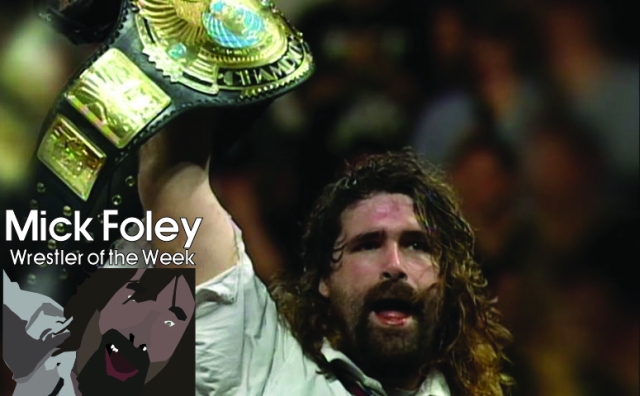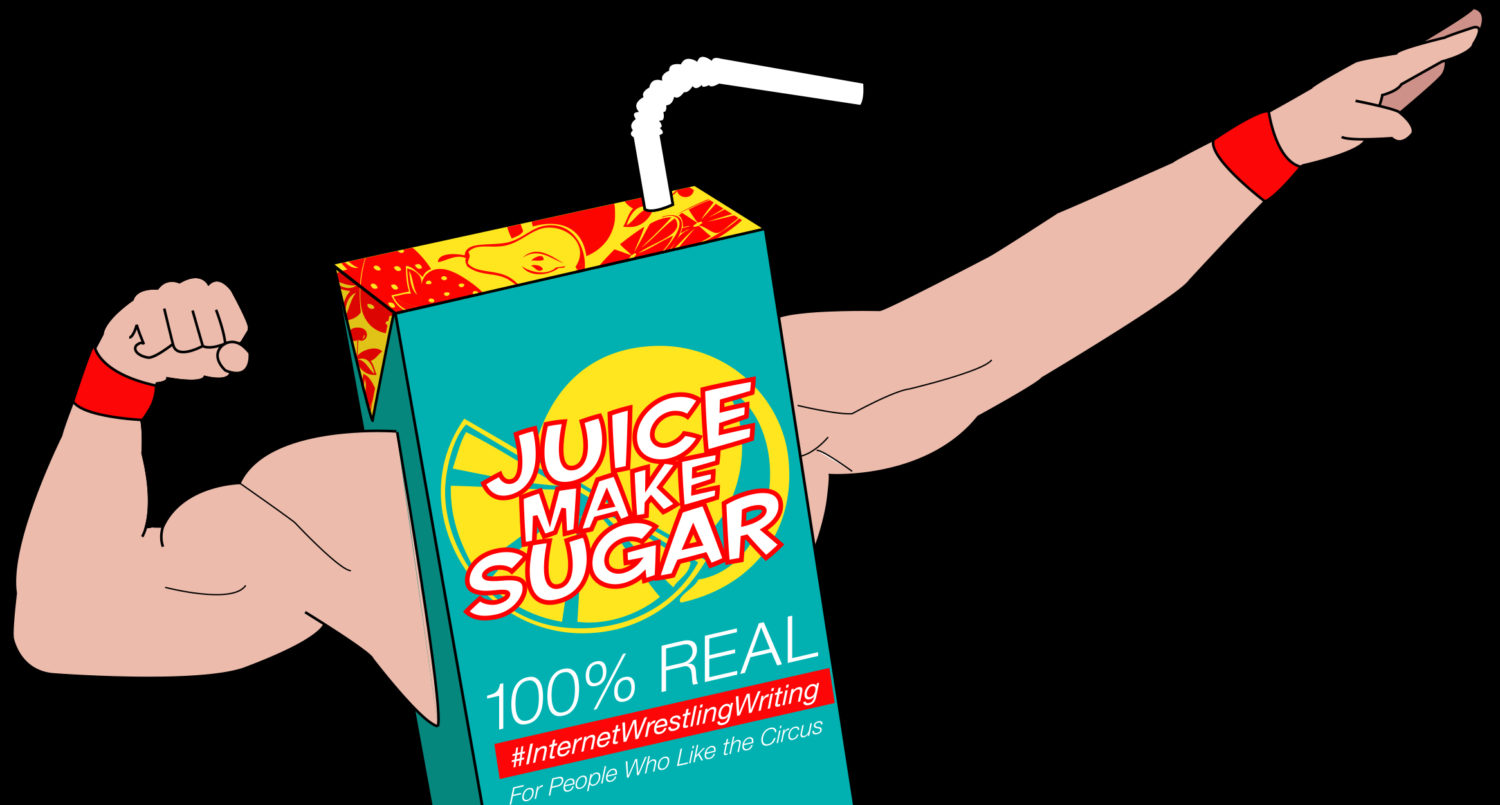
It’s the First Day of #FoleyWeek, a celebration of all things Wanted:Dead and the fourth installment of our (patent-pending) Juice Make Sugar Wrestler of the Week series. As always we’ll start by making Foley a Wrestler You (Should) Probably Know Better. Tomorrow we give you the finer points of the Dude Love oeuvre tomorrow with some Essential Viewing then march through Wednesday with a GIF Parade. After Hump Day we’ll make our Amazon.com-on-steroids dreams come true with “Juice Make Sugar Recommends…” before finishing everything off on Friday with a Difference of Opinion (where JMS HQ erupts in a Bang!Bang!-fueled civil war.)
I stopped watching wrestling for a couple of years. By the time boom period of the Attitude Era led to the bust that was Rey Mysterio BEATING RANDY ORTON AND KURT ANGLE in a Triple-Threat match at WRESTLEMANIA (sorry for the caps, but ANGER), I had not watched wrestling for several years. But, while reading the short-lived Sports Guy recommends… (which is different than Juice Make Sugar Recommends…, because it was real) series, I stumbled upon the History of the WWE Title DVD collection. For me, it promised the chance to relieve some of my favorite matches from my childhood, and if I could stand to sit through them, find out what happened in the time in between.
That’s basically what happened: I trudged through “forgotten classics” like Shawn Michaels vs. Bret Hart, Stone Cold Steve Austin and even some weirdo named Mankind (okay, I knew who Mankind was and liked him, of course, but for the sake of this story). They are all, in their own ways, great matches. I enjoyed them, but largely as nostalgia trips to remind me about what I used to love about wrestling — stories that allowed good to persevere over evil or let dreams come true or give comeuppance to smug people who so richly deserved it.
Then the first match of the third disc happened. And it’s why you are reading this right now, and why there is even a site called Juice Make Sugar.
***
That match, for anyone not lucky enough to have the DVD set for themselves, was Cactus Jack vs. Triple H in a Street Fight at the 2000 Royal Rumble. I’m not sure what it was, but I fell in love instantly. I had my conceptions of HHH, Mick Foley and even the WWE, and all of those were washed away in a single match.
Triple H had existed somewhere between “annoyed by everything DX did” and “didn’t like the Blueblood gimmick” for me, and while — being a Long Island guy — I liked Mick Foley I had never quite seen him for what he was, never thought to interpret anything he did as something other than a particularly talented stuntman doing work in a very specific field. I had watched largely before the era where blood had begun to replace psychology, and much like the DVD set itself, was essentially forced to wait until the third major act of the WWE ascension to see it.
This match may have played a major role in the blood = heat booking style, but Foley’s work, Triple H’s “proverbial crimson mask” and JR’s top-level work on commentary helps put the match into a completely different headspace. It even transports the crowd into a very specific stratosphere. Moving on from the basic “winning a sporting event” storyline found in nearly every match, the work by all involved helps to escalate the stakes, giving the fight the feeling that Triple H’s very survival as a member of the main event, the wrestling pantheon and even as someone the crowd will care about is at stake in a single match.
It’s the him in my head as a great wrestler first and terrible backstage-politicker fourth (with brilliant wrestling mind and dude who is banging Stephanie second and third). And none of it would have been possible, even for a second, without Mick Foley. And as an added bonus beyond the spine-tingling brutality that forces you to keep watching, the match tells his story better and more succinctly than any other performance in his 20+ year career.
***
With seemingly the entire state of New York behind him, Foley overcomes hardship after hardship until his resilience is pushed to the point where the choice of surrender is taken away from him, as Hunter finally puts down the beast with a Pedigree directly onto thumbtacks (and for those who have ever wondered how real wrestling can be: watch Earl Hebner having to count the three while avoiding getting TOO MANY thumbtacks in his hand). This is, of course, after Foley had suffered through several previous Pedigrees (including through an announcers’ table), roughly a thousand chair shots directly to his head, falling out of the ring while handcuffed and the indignity of having to be saved by The Rock and a fake policeman.
Pushed beyond his breaking point, Foley was forced to stay down not because he wanted to, but because to go any farther would have done permanent damage to himself and the industry. And we knew it had to happen, because you can’t keep flying so close to the sun on wings made of wax (and exploding barbed wire death matches). He was forced to stay down for the better of all of us (except for, seriously, poor Earl Hebner).
Unable to compete physically (because he was kind of lumpy and kind of goofy) as a traditional professional wrestling hero, Mick Foley has always played the part of the everyman. Underdogs require a certain level of pre-event hopelessness, where the odds are either stacked or rigged against them, and while they can certainly win, their victories are inherently upsets to the natural order of things. Because of this, runs based on the concept of “underdogged-ness” have a shorter shelf-life and must deal with the unfortunate consequences of continued success, including a sense of entitlement. The Patriots were underdogs until they weren’t, and now it’s reached a point where no one outside of New England was even upset when it turned out their TE was a murderer. No one care about them positively, and are only mildly excited to see them fail, no matter how miserably.
Everymen can achieve greatness without the backlash because there is humility in the proceedings. Anyone that’s watched Louie knows that being an everyman requires you to accept your lot in life, to accept that your time in the sun is not as great as those more blessed than you. Foley — he of the 24-hour title reigns — knew that he’d eventually get things taken away from him, but he’d continue to be a hero to those like him no matter how many times he was knocked down.
When he couldn’t get back up one last time, while depressing, was something we had known was going to happen eventually. At least we got hurt less than Earl.


[…] of our patent-pending Juice Make Sugar Wrestler of the Week series. Yesterday, we started with A Wrestler You Should Probably Know Better, today we give you the finer points of the Dude Love oeuvre with some Essential Viewing. We march […]
[…] of our patent-pending Juice Make Sugar Wrestler of the Week series. We started off with A Wrestler You Should Probably Know Better, before we gave you the finer points of the Dude Love oeuvre with some Essential Viewing. […]
[…] installment in our patent-pending Juice Make Sugar Wrestler of the Week series. We started with A Wrestler You Should Probably Know Better. Gave you the finer points of the Dude Love oeuvre with some Essential Viewing before marching […]
[…] installment of our patent-pending Juice Make Sugar Wrestler of the Week series. We started with A Wrestler You Should Probably Know Better. We’ve given you the finer points of the Dude Love oeuvre with some Essential […]